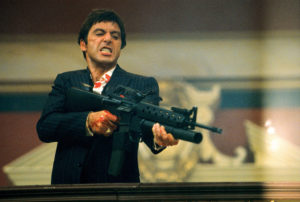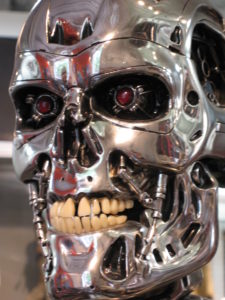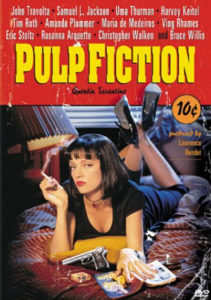When writing fiction, building a realistic character is mandatory.
From a distance, this task may sound easy. For what issues could arise from making a realistic character? You will just base them off of your own experiences and it will practically write itself. You’re sure of it…right?
Don’t be so sure.
Rather, be wary when pulling each detail from your own life to make a character realistic. This may backfire, and you could end up writing the main character (MC) too much like yourself.
Writers will argue that each character in their stories is a vivid reflection of themselves in real life—to one degree or another. I wholeheartedly agree. I have done it in the past and I will continue to do it in future stories. But the key is to draw only from the specific moments that you sincerely believe will apply to the MC’s journey and his actions within that journey. Still sound easy?
Contemplate this: What happens when you 50,000 words deep in your novel and you realize that your MC looks like you, acts like you, talks like you, even has the same job as you?
You are screwed.
That is when challenging decisions are made. Should you keep going? Or begin rewriting? Or just delete the whole thing? The best answer to that is: DO NOT PUT YOURSELF IN THAT POSITION IN THE FIRST PLACE.
To keep you from wasting your precious time from any rewrites, let’s discuss what I have to tell you about creating realistic MC’s for your fiction that doesn’t involve you adapting yourself. There are many subcategories I could have broken this list down into, but I am confident if you follow these four simple guidelines, everything will fall into place nicely and your MC will shine with believability.
The Realistic Goal
I’m a realist myself, so I can guess that you probably have searched other sites before this one. And in those travels, you most likely have come across a common thread amongst the building of MC’s: to have a goal.
As cliché as I feel it is, we are correct. Yes, the MC must have a goal. And it must be important to that character. It should be so important that if they don’t achieve it, their entire world will crash. Make their goal everything to them, as if they couldn’t live without achieving it. Failure is not an option—but don’t make the goal easy.
Before I give a few examples, let’s discuss why the goal is so damn important. Simply put, having a goal makes someone interesting. Think about people you know. They have goals of some sort. Maybe they work three jobs. Well, why on Earth would someone work three jobs? That is a lot of time dedicated to their daily schedule to give up for work. Well, maybe they want to save up for a boat. Or put their kids through college. Or maybe they are doing it to be away from their nagging spouse.
Whatever how much work they perform is irrelevant to the answer of the WHY. The answer to the WHY is what you need to know. When you decide to answer this question for your MC, it will set the beginning gears in motion and you will watch the plot move forward practically on its own.
Okay, now, let’s get into some good examples. As much of a literary nerd that I am, I will not use books or characters from books as my examples, as my experiences have told me that the majority of people are more familiar with films. I promise I will choose popular movies I think everyone already knows—or at least should know.
Terminator 2: Judgment Day (1991)
Yeah, John Connor, the little kid is—you could argue—the MC, but not really. He doesn’t have any goal except springing his mother from the mental asylum, which he does well into the first moments of the second act. Once that goal is finished, he runs away from the villain for the rest of the movie.
That movie is great because the MC is the Terminator this time. It’s his film. It’s him we route for to succeed and him we cry for when he dies.
What makes the T-800 the MC in T2? If you said his goal, you are correct ladies and gentlemen.
His goal is simple, but continues throughout the entire story and doesn’t end until the villain is killed. The Terminator must protect young John Connor from peril. John must grow up to be a military leader and save the world from the self-aware machines. The Terminator will do this at any cost.
He obeys Connor and promises not to kill anyone. The T-800 still maims them and breaks bones of those who pose a threat to the progression of Connor. He stays on high alert at all times, takes punches and bullets. He loses an arm from a gear and even reboots its own programming to live once again to follow this goal. His goal never ceases. As long as the T-800 can operate, he will strive to achieve his main goal.
Terminator 2: Judgment Day is a GEM of a movie. Truly one of the best action films ever. It has heart and tells a remarkable story of its characters. The Terminator goes through Hell to protect John Connor. There is no other reason for his Being—just protection. But by the end of the film, it feels more than that to the viewer because of the various hardships he went through to protect Connor. And sometimes, most times actually, a writer doesn’t have to create some elaborate, jigsaw mystery to reveal the MC’s goal. Sometimes, just by being there when nobody else would, is good enough.
The Realistic Flaw
Creating and developing a character flaw may seem easy at first. You will just make the MC arrogant. Or she hates public speaking. Seems easy enough, right?
The concerns arise when a writer realizes we must connect that flaw—in some way, either major or minor—to the MC’s goal. If your MC travels throughout the entire story without confronting this flaw, then that character didn’t complete his arc. The story will stay static and the readers might ignore your story.
The first mission is to choose a flaw that lines up with your MC’s personality and reflects the theme of the story. And then, set in motion situations where the MC must deal with that flaw. These scenarios do not have to happen too frequently and can only appear once in a narrative, but done properly, they will affect the MC in a powerful manner that will satisfy readers.
Scarface (1983) 
In any other narrative, having consideration for women and children wouldn’t be a flaw. However, within a story about a drug dealing, gangster such as Tony Montana, such an emotion doesn’t serve his goal (to stay out of prison).
Scarface is truly a rare film because it is able to tell an interesting story from an anti-hero’s point of view. The Godfather 1 and 2 are also relatable counterparts of an anti-hero’s journey if you wish to study further.
For those who have seen 1983’s gangster classic, you already know that the MC is not a nice man. He has no problem killing people and selling drugs to his community. He even steals the girlfriend of his boss. Tony is a bad guy in all regards throughout the entire movie. Those traits are considered flaws in the real world. However, Scarface flips expectations and instead highlights those flaws as positives because it is told through an antagonist/anti-hero’s perspective.
So, if murder and drugs are considered a positive in Scarface, what could be a flaw of such an MC?
Tony’s flaw is his desire to start a family.
As aforementioned, Tony faces prison time and is requested by other drug dealers to kill a journalist who has been bringing them much negative exposure. If Tony goes through with this request, he will be granted immunity from prison. Being the hardened killer he already is, Tony has no problem with this venture. However, once the journalist’s family arrives, Tony sees that he will not be killing just that one man, but also his wife and children. Needless to say, Tony doesn’t do what was contracted of him and then faces the consequences by enduring an attack from a more powerful gangster, which leads to his own demise.
The point is how Tony dealt with his specific character flaw. His desire to start a family of his own couldn’t allow him to kill an innocent family to save himself. Unlike other MC’s, Tony doesn’t overcome his flaw by the end of the story because it isn’t a negative flaw—it is only a flaw in a tale about an overall negative character in a negative lifestyle.
When developing a flaw for your own story, be sure to utilize that flaw for a crucial moment in the climax. This will ensure realism within the MC.
The Realistic Arc
Think of character arcs as if you are watching yourself. You certainly are not the same you now as you were a decade ago. You have learned many things and changed as a result. Perhaps you teased your family dog when it was eating and consequently suffered a bite to your hand. You probably never teased your dog ever again (or any dog for that matter). You changed and traveled through an arc within your own personal character and reached a new understanding. That is what happens in most storytelling.
To write better character arcs we should discuss why arcs are so important. The arc of an MC is important simply because YOU are important. And as you go through life, you change. Fiction reflects life, meaning that you can relate to it. When you are invested in an MC, you hope to see them overcome their flaw and achieve their goal. By completing these, they complete their arc and finish their story from a different emotional perspective than where they began.
Pulp Fiction (1994)
Pulp Fiction is Quentin Tarantino’s magnum opus and certainly one of the best pieces of written fiction ever, in my opinion. There is a wealth of creative information in this movie just waiting for other aspiring writers to learn from and create their own original stories.
While the film jumps around from character to character and uses multiple time fragments to keep you guessing, an MC may be difficult to nail down. However, it is Jules Winnfield, the gangster who has no problem swiping a burger and soda from a chump who deserves it.
Jules’ arc, because of the time jumps, is not the typical arc you will see in most other films. His character is introduced in the first few minutes of the movie but then disappears until the final act. When he reappears at the start of the third act, Jules begins his arc. He changes, and he doesn’t need an entire film to focus on his character to prove his worthiness for that change.
Jules begins as a ruthless criminal who has no problem with violence. He easily murders people. So, in a way, his character doesn’t exactly warrant a character arc, but the writer wants him to change because the arc that he goes through is not simple. Jules changes his entire course of life because of one moment.
After avoiding death by gunshots from a gunman hidden in a bathroom, Jules sees this as more than luck. He believes it as divine intervention. Jules thinks the bullets missing him were done with purpose rather than happenstance. Because of this, it completely alters the way he views his lifestyle and begins to change from then on.
Even when confronted by a team of thieves who wish to take his coveted briefcase, Jules still keeps to his belief that he is meant for something more by not killing them. Although he does pull a gun on them, Jules outright informs the robber of his new change. It becomes personal to Jules because he has every right to kill the robber but doesn’t. In fact, he allows the robbers to leave without consequence. Jules’ character arc was in jeopardy. If he would have killed the robber, then he would have regressed into the man he was before the bullets missed him in the previous scene. But, he stood strong and decided not to kill.
So, for your MC to achieve their arc successfully, they must realize what they once were as changeable. Then, they must make the change. And finally, they must be put in a situation where that decision to change is tested.
A Realistic Interest
To make a character realistic, a writer should incorporate a job into their character. It can be a career or a hobby or anything that the MC likes spending his time performing.
Why? You might ask. What importance does a job have on a compelling character or an interesting plot? Because it makes the MC relatable. We all work. We all have hobbies. Even the laziest of people still have things that keep them busy. By instilling a job into the MC, it then has the ability to teach the reader and also has other possibilities, as well.
For example, if your MC is a rocket scientist, his knowledge of physics could prevent the world from an asteroid. Or if the MC is a detective, her experiences with crime scene investigation could prove the murderer was actually one of her fellow detectives.
The job of the MC not only plays an intricate part in the overall plot, but it reveals just who they are to the readers. The readers care about the characters. They open a book or watch a movie because they want to know about the characters. Fantasy, humor, and horror are nice, but it isn’t why people seek fiction. We seek fiction because it allows us a path to know the characters, which then helps us know ourselves.
If written properly, the interest could tie into the goal, the arc, and the flaw.
The Matrix (1999)
Probably the most influential film of the last 20 years, The Matrix says a lot about cyberspace. It is a take so original on the simulacrum concept that it will never be matched.
And the writers of the film were correct in choosing their MC as a computer hacker. Technically, Neo is a software programmer in his “real life.” But after hours, he is a successful computer hacker who illegally infiltrates companies to install viruses.
Do you already see the connection of Neo’s profession and the plot of the film?
Imagine if the writers decided the Neo character to be a bus driver or a supermarket janitor. The flow and believability of the film would never have worked. Because the plot of the film involved a cyberspace environment, an MC who had experience in the arena only makes sense. Once alerted to the Matrix reality by way of swallowing the red pill, Neo’s job goes into full effect. Neo then is able to penetrate the Matrix and free others who are imprisoned. The Neo character and his allies act as a freer of minds and body to those who are captive by machines.
We learn who Neo is from his computer professions and we see how his talents assist him and others in the film.
Conclusion
When preparing to write a novel or a short story or a screenplay, these 4 details should be investigated thoroughly. The goal will keep the MC wanting to succeed. The flaw will help the MC overcome fears and setbacks. The arc is the change the MC must have to show that the MC is now different. And the profession helps the audience relate to the MC. If you can master these details, I guarantee the narrative will be easier to write.
Drop a comment. Email me for questions. See my service page for critiques.
But first, read my thoughts about a creative writing degree.
Keep writing!
~M



